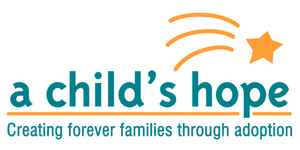By E. Parker Herring
The most common concerns I hear from birth mothers regarding adoption are concerns about the child feeling abandonment or resentment toward their birth mother, and also whether adoptive parents have the capacity to love adopted children as much as they would a biological child. These seem like logical questions at first, unless you’ve worked with adoptive families for years. The length that these families go through to adopt — the expense, the work, and the time that these families invest in the process — is reflective of a very strong desire for a family. And the absolute joy in their hearts when they are matched with a child is nothing short of extraordinary. These children are the most wanted, adored, and loved on the planet!
As open adoptions have become the norm for our agency, we encourage birth mothers to communicate with the child over the years. The best way for you to assure that your child knows that you love him is to give the adoptive parents something – a letter or a life book – that will show your love and express how you feel. Then continue to follow up over the years, and the child will be assured that you never forgot them, and only want the best for them.
The U.S. Department of Health and Services has posted the latest adoption statistics taken from the 2007 National Survey of Adoptive Parents (NSAP). This is the first empirical study with quantifiable evidence that can be used to combat common misconceptions that prospective birth parents and adoptive families have about adoption. These adoption statistics prove many of the more widespread misconceptions to be false.
General Adoption Misconceptions vs. Adoption Statistics
Misconception: “Will the adopted child be loved as much as a biological child?”
This is a very natural feeling that both the adoptive family and birth parents share before entering into an adoption. Any fears of the adoptive family not loving a child simply because it doesn’t have their genes are immediately eliminated as soon as the adoptive parents first lay eyes on their baby. This is true in nearly every single adoption.
Look no further than how the adoptive parents interact with the adopted child: Nearly 3 out of every 4 adopted children ages 0-5 are read to or sang to every day, compared with only half of non-adopted children who receive the same attention from their biological parents. Furthermore, well over half of all adopted children eat dinner with their families at least six days per week.
It’s no surprise that the adoption statistics show how much adoptive parents cherish the time they have with their children. They appreciate every day the opportunity to be a mom and a dad, and it shows.
They are the first ones at their son’s soccer practice, and they are in the front row of their daughter’s play. Their lives quite literally revolve around their children.
At first glance, the statistic about the majority of adopted children being read to every day may not seem like much, but looking further into the stat gives a glimpse into what adoptive parents are all about. Couples who struggle with infertility gain an astounding appreciation for the gift of parenthood. Adoption presents the couple with another chance to reclaim their dreams of raising a child, and it shows in the little things, such as reading to him or her before bed.
Another national adoption statistic says that 9 out of every 10 adoptive couples said the relationship they share with their adopted child is “very close,” and nearly half said that their relationship is even “better than expected.” Also, more than 9 out of every 10 people said they would “definitely” make the same decision to adopt again.
These statistics are remarkable considering all of the special needs babies that are adopted and the other complexities that may occur through adoption. These statistics proves that no matter how difficult the adoption process can be emotionally, the end result is what matters and that the family unequivocally loves the child.
Birth Mother Misconceptions vs. Adoption Statistics
Misconception: “My child will hate me because I placed her for adoption.”
This feeling is a consequence of people and media that are inexperienced in adoption. An extended family member or a friend who may not agree with the pregnant woman’s desire to place her child for adoption may say that the child will hate her if she goes through with it. Similarly, some television shows and movies have unjustly portrayed adoptees in this way as well.
The adoption statistic shows that over 90 percent of adopted children ages 5 and older have positive feelings about their adoption. Most adopted children are raised in happy homes by loving adoptive parents, so why would an adopted child hate his birth parents, the ones who provided him with a great life and his mom and dad?
Recently we posted a blog by a woman who shared her journey as an adopted child, speaking of the love that she felt for her adoptive mother, who she knew only as “Mom.” It’s a beautiful testament to the bond between mother and child that has little to do with biology, and everything to do with love.
For more, read about how Scott and Jennifer feel about their birth parents.
Birth mothers who are considering placing their child for adoption, are encouraged to contact A Child’s Hope on our 24-hour hotline at 877-890-4673 or text “pregnant” to 919-971-4396. Our compassionate counselors can listen and provide the information you need to make the best decision for you and your child.
